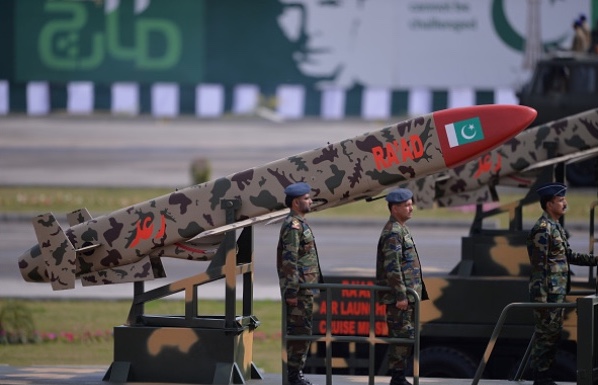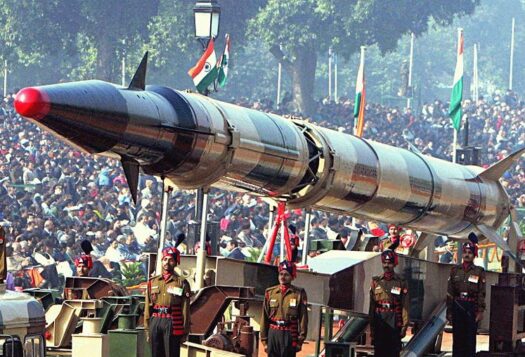
The respected political theorist, Kenneth Waltz, once argued “miscalculations cause wars.” The current climate on the Korean Peninsula suggests that false warnings, poor information, and misperceptions carry the risk of an accidental or surprise nuclear strike. The mutual provocations and threats between U.S. President Donald Trump and Kim Jong-un could push the crisis to a point where it becomes extremely difficult to deescalate. In the event of a nuclear exchange—whether initiated by North Korea or the United States—could have several unforeseen effects on nuclear deterrence in South Asia. In this essay, I argue the centrality of nuclear weapons in Pakistan’s national security strategy is unlikely to change in the event of a nuclear exchange in North Korea. However, depending on the nuclear use scenario considered, Pakistan could face increasing international and domestic pressure to take steps to stabilize its deterrence with India.
Nuclear use scenarios and the message to other nuclear states
A surprise or accidental nuclear detonation on the Korean Peninsula would end the so-called “nuclear taboo” that the international community has upheld for over 70 years. The political scientist, Nina Tannenwald, first coined the term “nuclear taboo” in 1999 to describe the normative prohibition on nuclear weapons use, which constrains states from resorting to the nuclear option without “moral opprobrium or political costs.”
A nuclear attack initiated by the United States on North Korea would set a harmful precedent and potentially lead to several knock-on effects. First, it would severely damage the United States’ global image. More dangerously, it could legitimize nuclear first-use by smaller states in the name of self-defense against larger nuclear states. In turn, this could lead to increased nuclear proliferation among smaller states. Finally, a nuclear attack launched or eventuated by the United States, a county credited with laying many of the foundations of the nonproliferation regime, would set a very damaging precedent regarding the relevance and efficacy of international regimes, norms, and law.
There is no victory for North Korea either if it were to initiate a nuclear first-strike. Initiating a nuclear strike would essentially invite the end of the North Korean regime given the retaliatory nuclear and conventional capabilities of the United States and its allies. However, regime change would not be accomplished without massive human causalities in North and South Korea. In contrast to the U.S.-initiated scenario above, smaller states would likely be dissuaded from pursuing nuclear weapons given the overwhelming response to North Korea’s provocation.
Effect of a Korean nuclear detonation on Pakistan’s nuclear posture
If the nuclear taboo was broken either by North Korea or the United States, nuclear weapons would likely not minimize in significance in Pakistan’s national security policy. Indeed, it might further strengthen the justification for its first-use nuclear doctrine.
The primary reason a Korean detonation would not change Pakistan’s nuclear posture is the perception that Pakistan differs in important ways from North Korea. One, Pakistan sought nuclear weapons to establish deterrence and offset its conventional inferiority to India, refraining from provocative behavior towards the global community in the process. Unlike North Korea, Pakistan also never violated or withdrew from the Nuclear Nonproliferation Treaty (NPT) since it has always remained a non-signatory. Likewise, Pakistan participates in several nonproliferation protocols, including the Global Initiative to Combat Nuclear Terrorism and Resolution 1540.

While some observers have expressed doubt, Pakistan has established a relatively clear nuclear posture with comprehensive command and control mechanisms. Pakistan’s current policy of “recessed deterrence,” in which nuclear warheads are not “mated” to delivery systems, provides further evidence of Pakistan’s preference for deterrence stability with India. While Pakistani political and military leaders have indulged in provocative rhetoric in the past, there is little appetite at the leadership level to break the nuclear taboo.
These differences from the North Korean case underscore what Pakistanis view as a rational approach to deterrence and nuclear use. Namely, if deterrence fails and Pakistan and India enter into a conflict that forces Pakistan to question its survival as a state, the use of nuclear weapons would only then become justified. In conversation with the author, a leading military officer confirmed the argument above, stating that “morality and norms hold no ground [on nuclear use] when the question comes to national security and survival.”
Regional and international implications of a Korean detonation
Even while Pakistan’s deterrence strategy would be unlikely to change, Pakistan would need to consider the effect of a detonation on the Korean peninsula on regional stability. First, a nuclear detonation in North or South Korea could compel India to move away from its “no first use” (NFU) policy regarding nuclear weapons to a first use posture. This would especially be the case in the event of a U.S.-initiated nuclear strike.
A first use posture has significant stability implications for India-Pakistan relations as the strategy embraces the use of preemptive, counterforce strikes on Pakistani nuclear assets. Two, the change in India’s posture would increase nuclear risk on the subcontinent by forcing both the states to increase nuclear readiness by mating warheads to delivery systems, and thus increasing the chances of a nuclear exchange or accidental nuclear detonation.
Apart from India’s response, a nuclear detonation in North Korea may induce new strategic thinking in Pakistan and the broader world. First, a catastrophic nuclear detonation on the Korean Peninsula would generate a level of fear in the Pakistani public that could amplify the public’s participation and voice in the nuclear policymaking process. This development may not change Pakistan’s national policy on nuclear use, but it could generate a new debate on the consequences of nuclear use and potentially inculcate a renewed sense of restraint.
In addition, following a nuclear detonation on the Korean Peninsula, the international community might introduce new measures to increase the robustness of international norms and verification regimes. For example, India and Pakistan are the only two countries (besides North Korea) that have not signed the Comprehensive Test Ban Treaty (CTBT) and both countries could come under mounting pressure to sign the treaty. Additional international pressure could come in the form of pushing India and Pakistan to accede to verification procedures under the Fissile Material Cut-Off Treaty (FMCT) or to release updated nuclear posture statements.
Pressures to engage in arms control may not only come externally. Internally within Pakistan and India, nuclear use on the Peninsula—particularly if it is initiated by North Korea—could guide both countries towards greater deterrence stability in the name of war avoidance. Increased deterrence stability could then lead to improved ties between India and Pakistan that open a path to revised and new nuclear confidence building measures (CBMs).
Conclusion
An unthinkable event, including a nuclear exchange in North Korea, must be deeply considered by academics and strategic communities in nuclear weapons states. The potential for nuclear use may appear esoteric and hypothetical, but could all too easily become a reality. Avoidance of such a reality will require considerable effort from military officials and policymakers inside India and Pakistan.
Although the nuclear taboo holds no legal mandate, its cessation cannot be allowed. After 72 years without a nuclear weapons attack, any action that undermines this global achievement would have unbearable consequences in the future. At the moment, trends in Pakistani politics are steering Pakistan towards greater reliance on nuclear weapons. To counteract this dangerous arms race in South Asia, a regime of strategic restraint and new arms control mechanisms need urgent institutionalization. In parallel, Pakistan should improve its conventional technologies and invest more into diplomatic engagement with India. Ignoring the “unthinkable” in North Korea is not a luxury South Asian policymakers can afford and thinking through these risks is the only path to greater stability.
Editor’s note: If there is nuclear use in the North Korean context, what will the dangers or consequences for India and Pakistan be, whether strategic, political, economic, or environmental? How will this impact India and Pakistan’s thinking on nuclear issues, the importance they give to nuclear weapons in their security strategies, and their impressions of regional security? SAV contributors Rizwana Abbasi and Hina Pandey analyze in this two-part series, which can be read in full here.
Click here to read this article in Urdu
***
Image 1: (stephan) via Flickr.
Image 2: Aamir Qureshi via Getty Images.


